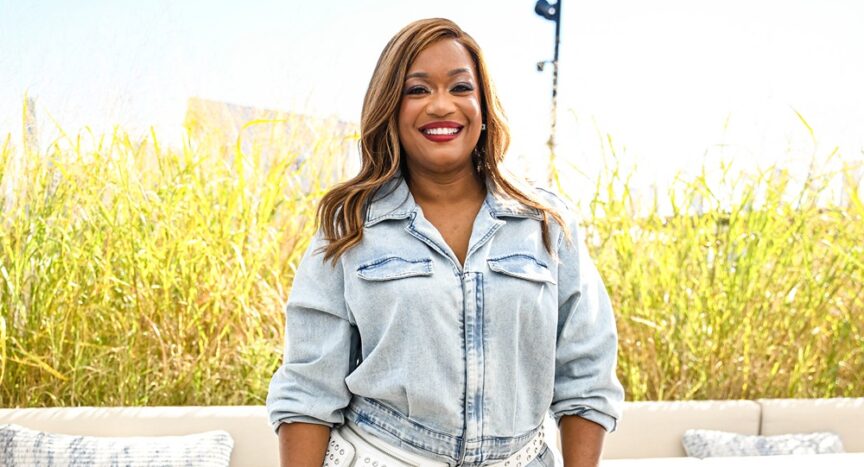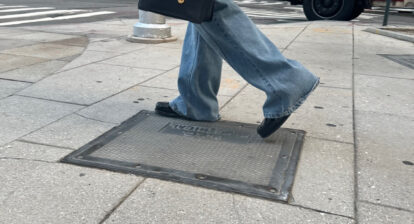Like many, the journey with ulcerative colitis for chef Sunny Anderson began with cramps she assumed would go away on their own in a handful of days. But the pain lasted for weeks that stretched into months, and the symptoms grew more alarming with the passing days. When her father urged her to visit the doctor to check if something more serious was going on, a gastroenterologist officially diagnosed her with the disease.
That was 30 years ago, but ulcerative colitis is still as much of a mystery to people now as it was in 1994, when Anderson began trying to research more about her diagnosis. Now, the Food Network star is opening up about her personal path to remission, hoping to inspire thousands of others that they can also learn to live a life without boundaries. Her honesty comes at a critical time in ulcerative colitis research.
Doctors and researchers have recently seen an uptick in diagnosed cases of ulcerative colitis in Black Americans. This chronic disease, classified as an inflammatory bowel disease, causes inflammation of the colon. The illness, also known as UC, can bring debilitating pain for the estimated 1.25 million Americans living with the disease.
Despite the increase in data, experts suspect that ulcerative colitis is underdiagnosed in the Black community. Patients may be afraid to have an honest conversation about their pain with loved ones and doctors because of a sense of embarrassment surrounding their symptoms. Healthcare experts believe it could also be due to unequal access that Black Americans have to medical tests and exams compared to their white counterparts.
Due to these factors, many may not even discover that they are living with ulcerative colitis until much later in life when the pain has started to take a heavy toll on their personal and professional lives.
For Anderson, her symptoms interfered with her time on-air as a radio host. She remembered making those trips to the bathroom between songs and the ordeal of making sure her co-hosts could cover for her.
“For me, it was coming back after being diagnosed and saying to all of my coworkers, ‘Hey guys, I have this disease called ulcerative colitis,’ to blank faces. No one had heard of it,” Anderson said. While her co-hosts were understanding, she recognized that there was still a harmful stigma and confusion around the disease.
Still, staying silent and muscling through the pain can have devastating consequences.
While every individual experiences ulcerative colitis differently, symptoms to look out for include consistent and prolonged cramping, rectal bleeding and an urgent feeling of needing to use the bathroom. Ignoring UC can lead to life-threatening complications down the line, including colorectal cancer or developing a perforated colon.
“I realized in order to live with it, to live fully with it, I had to tell other people what was going on with me,” she said. Now, she wants others to feel empowered enough to do the same. “It’s like I’m taking care of my 18-year-old self. I love that. ‘Cause it was tough.”
The chef jumped at the chance to team up with Pfizer and put information on ulcerative colitis in the spotlight. “Pfizer came to me and said… ‘We want people to know about what you’re going through and feel like there’s a community. And we want you to amplify your voice through us so we can tell people where to get these resources.”
Together, they developed the “Live Fully” campaign, encouraging individuals with ulcerative colitis to take control of their health by breaking down the barriers to accurate information on the disease. The campaign includes easy access to resources on the This Is Living With UC website and the LivingWithUC app.
While there is no one-size-fits-all solution for folks diagnosed with UC, the team is working to build an inclusive community for everyone managing good and bad days with the disease. The “Live Fully” network of professionals and patients lets people share their stories, helping to lift the heavy mental burden of trying to figure it out alone.
Along with consulting a doctor and the website, folks can experiment with recipes in Anderson’s 2013 cookbook, Sunny’s Kitchen: Easy Food For Real Life, for flavorful dishes that are easy on the stomach.
Anderson says one tip that can help everyone is to pay attention to your body—how it reacts to your diet, medication and exercise. Tips about keeping a personal UC journal to better understand your body and health regimen are accessible on the campaign’s website.
But UC affects more than just the body; mental health can also take a hit when balancing a career with battling the disease. “I love the meditation,” Anderson said of the app’s features, “because I feel like a lot of times when you’re dealing with something like this, it can get into your head, and you just wanna just relax and chill out.”
Anderson’s best advice to others in the same shoes she was in 30 years ago? “Don’t wait. Just go in. Tell the doctor your symptoms. Take notes. Notice it.”



